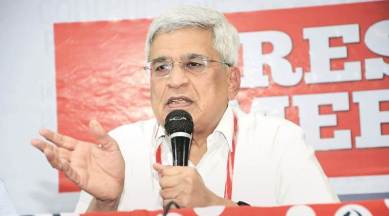Stay updated with the latest - Click here to follow us on Instagram
‘Disturbing signs of SC failing to live up to responsibilities’
In an article titled “Supreme Court Failings”, Karat wrote, “Unfortunately, over a period of time, there are disturbing signs of the Supreme Court failing to live up to its responsibilities and to act as the custodian of the Constitution."

CPM politburo member and former general secretary Prakash Karat on Thursday said there are “disturbing signs” of the Supreme Court “failing to live up to its responsibilities”.
He argued that Justice Ranjan Gogoi’s tenure as Chief Justice was marked by the court’s increasing acquiescence with the executive and compromising with majoritarianism on matters of faith.
monthly limit of free stories.
with an Express account.
In an article titled “Supreme Court Failings”, Karat wrote, “Unfortunately, over a period of time, there are disturbing signs of the Supreme Court failing to live up to its responsibilities and to act as the custodian of the Constitution. That this is happening at a time when an authoritarian Hindutva regime is working to subvert the secular-democratic framework of the Constitution becomes a matter of serious concern.”
The article will appear in the forthcoming edition of the CPM mouthpiece Peoples Democracy.
A Malayalam version of the article appeared on Thursday in CPM’s Kerala daily Deshabhimani.
In the article, Karat mentioned the Supreme Court judgments on Ayodhya, Kashmir, Sabarimala and electoral bond issues to back his charge.
He said the manner in which the apex court has dealt with a host of petitions regarding the restrictions imposed on citizens, including detention of political leaders and activists, in J&K was “truly inexplicable”.
All the order of September 16 did, he said, was to direct the central government and J&K administration “to ensure that normalcy is restored in J&K on a selective basis and without compromising on national interest”.
“By this, the court gave the executive sufficient leeway to selectively relax restrictions and also made it conditional to not compromising with national interest. Delay in giving a judicial verdict is a form of judicial evasion which enables the government/ executive to get away with a wrong measure or policy,” he wrote.